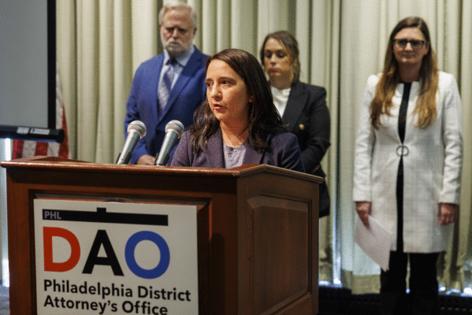Trump administration cuts $600,000 from Pa. Innocence Project
Published in News & Features
PHILADELPHIA — The Trump administration has terminated a three-year, $600,000 grant to the Pennsylvania Innocence Project, which has helped exonerate around 35 people in the state incarcerated for crimes they didn’t commit.
The nonprofit learned about the cuts, from funds initially awarded by the U.S. Department of Justice, last week.
In a newly released statement, the Project, with offices in Center City and Pittsburgh, asks potential donors to help the “small but mighty organization” continue its work.
“This was a mistake by the administration,” said David Rudovsky, a Philadelphia civil rights attorney who cofounded the project in 2007, and who litigated some of its cases. “It will limit the ability of our organization to be able to exonerate innocent people.”
Along with the Project, the federal government has cut an estimated $430 billion in the first 100 days of the Trump administration, according to research done by Democrats in the U.S. House of Representatives.
Around 120,000 federal workers have been laid off or targeted for layoffs from about 30 agencies, according to CNN.
The Trump administration did not respond to a request for comment about cuts.
The loss of the $200,000-per-year funding represents a 13% cut in the nonprofit’s annual budget of $1.5 million, Rudovsky said.
It’s unclear how that deficit will be absorbed, he added.
That money had been awarded to the Project at the end of last year, according to the nonprofit’s statement. It was earmarked to increase the organization’s capacity to handle cases under active investigation.
Such grants “have helped us to grow the Project into the organization that we are today, and we have a strong track record for securing and managing effective grant-funded work.”
The Project has been lauded for “righting egregious wrongs, and for helping restore faith in the justice system,” said Marissa Boyers Bluestine, an assistant director of the Quattrone Center for the Fair Administration of Justice at the University of Pennsylvania Carey Law School.
She was the Project’s original legal director, and was involved in 17 of its exonerations.
Currently, the Project has four staff attorneys, but it’s worked with numerous lawyers who’ve pitched it pro bono over the years.
On its website, the Project lists many of the people it has helped, a litany of wrongly accused individuals who’d spent years in prison without ever having committed the crimes that got them arrested.
Among them was Marshall Hale, who was convicted in 1984 of raping a 14-year-old.
The victim incorrectly identified Hale, then 21, who was sentenced to 33 years in prison.
The Pennsylvania Innocence Project sent the lab reports from Hale’s case to Larry Presley, the director of the Forensic Science program at Arcadia University and former head of the FBI DNA Analysis Unit.
Presley verified that Hale’s blood and semen could not have been at the crime scene or in the rape kit gathered shortly after the crime.
Marshall was released in 2017.
“There are still cases where investigators get tunnel vision and end up convicting individuals who may be innocent,” Presley said in an interview on Thursday. He’s now a professor of criminal justice at Liberty University in Lynchburg, Virginia.
Presley added that he’s not sure whether the termination of $600,000 from the Project will ultimately be harmful. But its work will always be needed.
“The justice system doesn’t always get things right,” he said. “So, institutions like the Innocence Project make a contribution to truth and justice that’s vital.”
(Staff writer Chris Palmer contributed to this article.)
©2025 The Philadelphia Inquirer. Visit inquirer.com. Distributed by Tribune Content Agency, LLC.







Comments